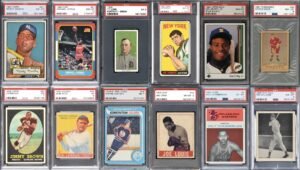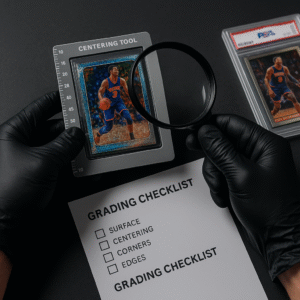SGA Grading
May 7, 2025

Thinking about submitting to PSA or SGC but want to avoid wasted fees and frustration? Use this refined grading checklist for PSA SGC to evaluate which cards truly deserve grading—and which should stay in your collection.
PSA Gem Mint 10 demands a front centering of 55/45 or better, and 75/25 or better on the reverse.
PSA Mint 9 allows 60/40 front, 90/10 back; graded lower tiers have looser tolerances.
SGC is often stricter, requiring ideal centering (around 50/50 for top grades), with 55/45 acceptable for Gem-level markings.
Pro Tip: Use a centering ruler or digital tools to check alignment before submission. Modern cards are easier to measure than vintage.
PSA/Edit grading involves four criteria: surface, corners, edges, and centering—the lowest quality of these defines the card’s grade.
Surface: No scratches, stains, or intrusive print/wax marks.
Corners: PSA 10 requires four flawless corners; even tiny whitening drops it to PSA 9.
Edges: Chips or notches even along dark borders can impact the grade.
SGC graders often scrutinize surface quality more heavily—minor flaws that PSA might overlook can prevent high grades.

Grading costs add up, so focus on cards that:
Will likely earn a PSA/SGC 9 or 10
Can resell for at least $100 post-grade
A typical submission costing $20–$30 makes sense only if the card’s finalized value justifies it.
Maximize ROI by submitting:
Rookie Cards (flagship, Chrome, Heritage, Bowman)
Numbered parallels & short prints (SPs/SSPs)
Autographs (especially on-card or low-numbered)
Avoid slabbing common base cards unless they’re extremely high quality and likely grade well.

Before sending your cards through SGA’s concierge process:
Inspect under angled light with magnification for surface flaws, print lines, or bubbling
Use a soft cloth—no rubbing, just gentle dust removal
Verify perfect corners and edges using a 20× loupe
Check centering visually and/or with a ruler
Measure card value potential using recent eBay or PSA/pop report comps
We handle pre-screening with official grading criteria
We only submit cards that meet strict quality and value checks
You save on grading fees, shipping, and possible disappointment
Our reports track submission results, pop data, and resale strategy
| Question | Answer |
|---|---|
| Will an OC (Off-Center) qualifying flag hurt resale? | PSA often includes OC qualifiers—these typically don’t significantly reduce market value, though pop updates matter. |
| Can a card slip from PSA 10 to PSA 9 due to centering? | Yes—PSA tightened 10 centering to 55/45 recently, affecting borderline submissions. |
| Is pre-grading under SGC easier? | SGC is generally more exact on surface and centering, but often offers quicker turnaround. |
Combine strict centering (55/45 front / 75/25 back), clean surface/corner condition, and proven market value ($100+ at PSA 10) as your grading formula. Grading is a strategy. Use this grading checklist for PSA SGC and let SGA handle the rest with our concierge service—so your grading spend works smarter for you.
Get tips, product drops, and break alerts—just for collectors.

Family-owned. Collector-driven.
© 2025 SGA Trading Cards. All Rights Reserved.
Proudly based in South Georgia.